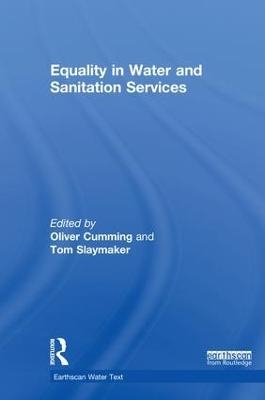
Equality in Water and Sanitation Services
Routledge (Verlag)
978-1-138-20349-5 (ISBN)
There is growing acceptance that the progress delivered under the Millennium Development Goal target for drinking water and sanitation has been inequitable. As a result, the progressive reduction of inequalities is now an explicit focus of the Sustainable Development Goal (SDG) targets, adopted in 2015, for universal access to drinking water, sanitation and hygiene (WASH). This shift in focus has implications for the way in which the next generation of WASH policies and programmes will be conceived, designed, financed and monitored.
This book provides an authoritative textbook for students, as well as a point of reference for policy-makers and practitioners interested in reducing inequalities in access to WASH services. Four key areas are addressed: background to the human right to water and development goals; dimensions of inequality; case studies in delivering water and sanitation equitably; and monitoring progress in reducing inequality.
Oliver Cumming is an Assistant Professor of Environmental Health at the London School of Hygiene and Tropical Medicine, UK, where he works on the epidemiology of water and sanitation-related diseases. He is currently working on multiple trials to assess the impact of water and sanitation interventions on childhood enteric infection, undernutrition and oral vaccine failure in Africa and South Asia. Tom Slaymaker is a Senior Statistics and Monitoring Specialist in the Data and Analytics section at UNICEF Headquarters, USA. He has nearly 20 years of experience working on water and sanitation in Africa and Asia, and currently co-leads the WHO/UNICEF Joint Monitoring Programme for Water Supply, Sanitation and Hygiene (JMP).
1. Progress in tracking inequalities – lessons from MDG monitoring 2. The human rights to water and sanitation: challenges and implications for future priorities 3. The potential of the SDG framework to promote equality through WASH initiatives 4. Equality in water supply provision – Beyond numbers served 5. WASH and Gender: understanding gendered consequences and impacts of WASH in/security 6. The Environmental Dimensions of Universal Access to Safe Water 7. How international water and sanitation monitoring fails deprived urban dwellers 8. First a basic service for all – reducing WASH inequalities through more equitable funding and financing strategies. 9. Breaking the barriers – disability, ageing and HIV in inclusive WASH programming 10. Addressing the Menstrual Needs of Women and Girls is Necessary to Achieve Gender Equality in Water and Sanitation Service Delivery 11. The interlocking inequalities of poor water and sanitation, poor nutrition and lack of access to healthcare 12. Monitoring inequalities in WASH service levels 13. Benchmarking progress on reducing inequalities over time 14. Counting the costs and benefits of equitable WASH service provision 15. Inequality beyond the toilet: fecal sludge management and the community-level dimensions of sanitation
| Erscheinungsdatum | 05.10.2018 |
|---|---|
| Reihe/Serie | Earthscan Water Text |
| Zusatzinfo | 13 Tables, black and white; 29 Line drawings, black and white; 19 Halftones, black and white; 64 Illustrations, black and white |
| Verlagsort | London |
| Sprache | englisch |
| Maße | 156 x 234 mm |
| Gewicht | 612 g |
| Themenwelt | Sachbuch/Ratgeber ► Gesundheit / Leben / Psychologie |
| Naturwissenschaften ► Biologie ► Ökologie / Naturschutz | |
| Technik ► Bauwesen | |
| Technik ► Umwelttechnik / Biotechnologie | |
| ISBN-10 | 1-138-20349-1 / 1138203491 |
| ISBN-13 | 978-1-138-20349-5 / 9781138203495 |
| Zustand | Neuware |
| Informationen gemäß Produktsicherheitsverordnung (GPSR) | |
| Haben Sie eine Frage zum Produkt? |
aus dem Bereich


